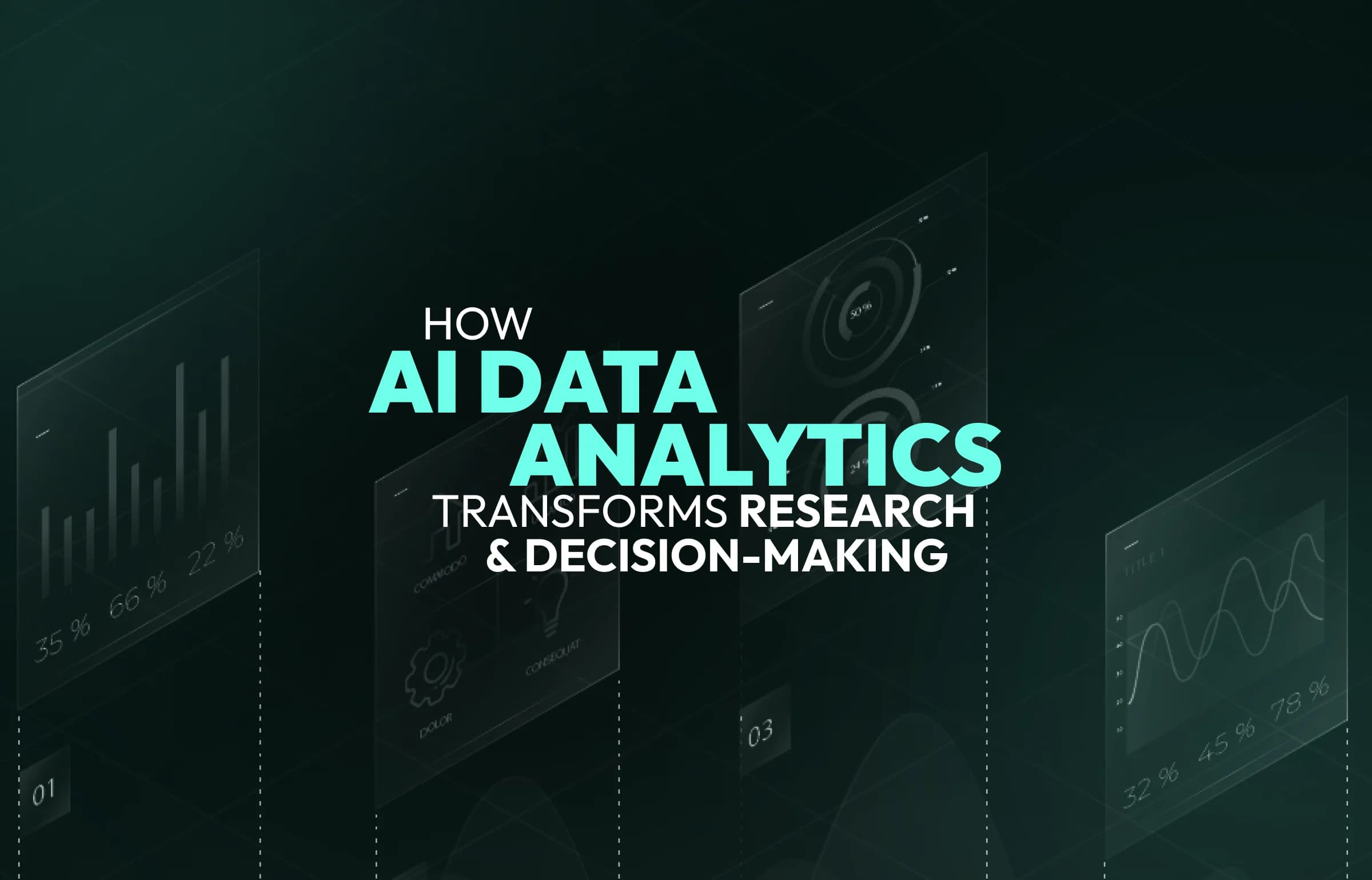
All How is Artificial Intelligence Used in Cloud Computing: Benefits, Challenges, and Use Cases in 2025
March 19, 202510 min read
Intro
Merging AI with cloud infrastructure boosts efficiency by accelerating tasks, which allows IT experts to focus more on development. AI in the cloud provides key data, powerful computing, and fast innovation. This, in turn, improves machine learning cloud services with automation, better performance, enhanced security, and valuable insights.
About 80% of American companies use AI, and consider it vital for their digital transformation. They are spending between $500,000 and $5 billion each year on AI projects.
Check out this guide to explore the future of AI cloud computing with its benefits, potential challenges, and real-world applications. Read on for expert insights from SapientPro's team.

AI and Cloud Computing Explained
Artificial intelligence allows computers to do tasks that usually need human thinking, like understanding and translating speech or creating images from descriptions. AI can also do things humans can't, like making complex calculations and analyzing huge amounts of data quickly to find patterns.
Cloud computing lets you rent IT services instead of buying them. Businesses can use the internet to access databases, software, and hardware, paying only for what they use. It's known for being scalable, always available, and you only pay for what you use. Besides this, cloud computing provides servers, databases, storage, as well as data analytics and AI services.
Cloud service providers were among the first to use AI to improve their services. In structured IT settings, AI is great for making decisions, which helps companies automate tasks in their data centers. AI can manage tech services, adjust resources, monitor cybersecurity threats, spot potential errors, and detect fraud.
Impact of AI on Cloud Computing
AI has significantly improved cloud computing, expanding its potential and uses in different fields. Here are the key areas:
- Automated data processing: AI tools can quickly handle large amounts of data, making it easier to organize and use;
- Predictive analytics: with AI, cloud services can analyze past data to predict future trends, which helps businesses make better decisions;
- Resource allocation: AI improves cloud efficiency by predicting needs and adjusting resources. This saves money and increases performance;
- Cost management: AI models can predict how resources will be used and suggest ways to save money, such as automatic scaling and balancing the workload;
- Personalized user experience: AI enables cloud services to create customized experiences to match each user's preferences, behavior, and circumstances;
- Threat detection and response: AI can improve security by detecting unusual activities and potential threats as they happen and respond automatically;
- Fraud prevention: AI-powered cloud services continually monitor user behavior to detect and prevent fraud;
- Natural language processing (NLP): AI enables features like conversational interfaces and voice applications, which improves user interactions.
AI enhances cloud services by making them smarter and more flexible. It helps platforms wrangle vast data, surface insights and forecast results. Need guidance shaping that architecture? Check out our cloud integration support options.
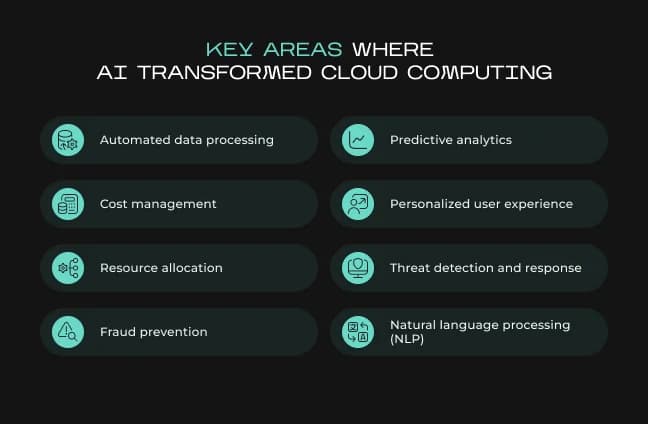
Impact of Cloud and AI Adoption
Today, more and more industries are using AI-based solutions. For example:
- In healthcare, it's used for tasks like medical imaging, finding new drugs, and caring for patients;
- E-commerce platforms use it to study customer behavior, provide tailored recommendations, and improve shopping experiences;
- In finance, it helps with data analysis and real-time monitoring of financial data and market trends;
- Smart factories use cloud AI systems to analyze sensor data, which helps with predictive maintenance and quality control to improve production.
In 2023, cloud adoption added over $1 trillion to the global economy, with AI powered by the cloud generating over $98 billion. Between 2024 and 2030, it's expected that cloud adoption will contribute more than $12 trillion to the global economy, with cloud-based AI adding an extra $1.5 trillion.
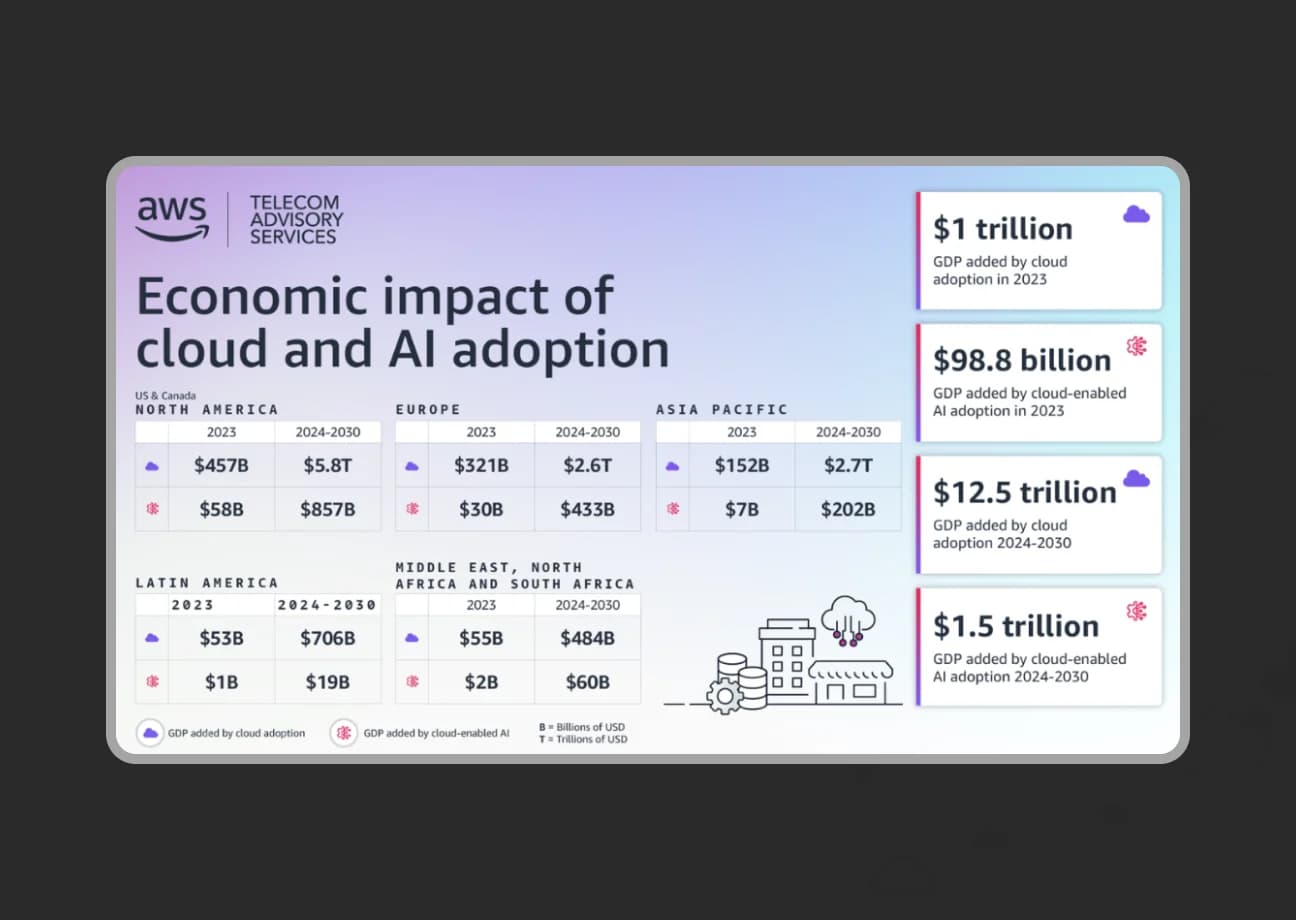
AI-Powered Self-Healing Systems
AI transforms business cloud management by allowing systems to quickly react and predict actions, allowing them to optimize, fix, and secure themselves with little human help. For example, AI can detect fraud by continuously monitoring for issues like data corruption or hardware problems. When something is found, the system can automatically address it by restarting components, recalculating, or using self-repair methods.
Imagine code that can fix its own mistakes. Self-repairing code uses methods like automated analysis, symbolic reasoning, and code creation to solve its errors. This cuts down the need for human help and makes the system more reliable.

Self-healing AI models continue to learn and adapt to new data and experiences. They can identify and fix biases in their training data, make better decisions, and develop over time.
Benefits of Cloud Computing and Artificial Intelligence
Cloud computing providers who add AI to their data centers don't just see quick improvements in efficiency and cost savings. By offering these advances as their own AI services, they can increase customer loyalty and make more profit. Let's take a look at some benefits of using AI in machine learning cloud solutions.
Automation and Efficiency
Automation plays a big role in cloud operations, affecting areas like data analysis, management, and security. AI algorithms reduce the time and effort required to build, test, and manage resources in cloud environments. This allows for more focus on complex tasks and keeps business processes running smoothly and efficiently.
Improved Data Management and Analysis
Cloud-based AI tools can handle and analyze big sets of data to find insights and trends that might be missed with traditional methods. This is especially important today, where understanding customer behavior and market trends can provide a significant competitive advantage.
Cost Savings
AI helps save money by handling complex tasks quickly and with fewer employees. It efficiently manages resources like computing power and memory, reducing waste and cutting costs.
For clients, AI makes it easy to customize cloud business services to fit their needs, which can save money. This flexibility can also boost customer loyalty, especially when cloud providers offer clear billing.
Scalability
Cloud AI platforms automatically manage resources by adding servers during high demand and reducing them when demand is low. This ensures everything runs smoothly without manual input.
AI algorithms also help evenly distribute tasks, enhancing performance and reliability. This load balancing effectively manages changes in demand and makes the best use of resources across various places and time zones.
Enhanced Cloud Security
AI protects against cyberattacks by identifying and stopping threats in real time. It analyzes patterns to find unusual activities and immediately responds to dangers. This is especially useful for identifying new security weaknesses and phishing attacks that might slip past standard security systems.
AI also plays a key role in detecting insider threats. It monitors user behavior to catch unusual activities, like strange access patterns or large data transfers, which could indicate malicious intent. This triggers alerts that allow security teams to investigate and address the issue before it becomes a serious problem.
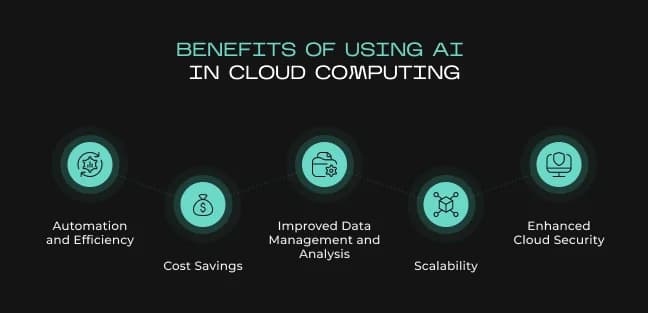
Challenges of AI in Cloud Machine Learning and Computing
Integrating AI into cloud environments has many benefits, but it also comes with certain challenges. Because AI processes large amounts of data, there is a higher risk of security breaches and unauthorized access. Therefore, a key concern is how to ensure data privacy and security.
Here are three main challenges when using AI in cloud computing.
Issues with Network and Infrastructure
For AI applications to work well in the cloud, a stable internet connection is necessary. In places with weak infrastructure, keeping up the required network speed and reliability can be difficult. High latency can affect AI performance, so having a strong network is important for uninterrupted operations.
In addition to connectivity, AI processing also requires powerful computing and plenty of storage. As cloud businesses develop, environments need flexible systems to manage more data and AI tasks. Advanced network technologies can improve connectivity, helping organizations make the most of AI's capabilities.
Concerns About Keeping Data Private
When using AI in cloud environments, keeping data private is essential. AI systems work with a lot of personal data, which can lead to risks like data breaches and unauthorized access.
To protect customer information and comply with rules like the GDPR, organizations should implement strong data security measures. This not only meets legal requirements but also helps maintain customer trust and supports the integrity of the business.
Lack of Experts
Successful operations in cloud computing and AI require skilled employees. Data scientists and AI specialists are those who handle and deploy AI models, so they need specific skills to efficiently implement and expand AI cloud services.
Organizations should invest in training and retaining experts in AI and cloud technologies to address challenges and fully benefit from AI integration.
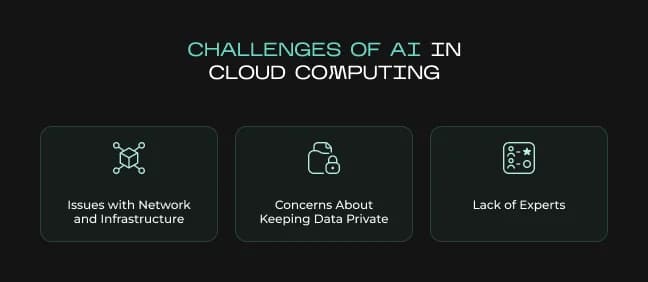
Use Cases of AI in Cloud Computing
Healthcare, customer service, media, education, finance and many other industries are gaining a lot from AI and cloud computing. Let’s look at some most common AI uses in the cloud.
Recommendation Engines
An AI-powered recommendation system uses machine learning to analyze and rank products or users. It predicts a user's rating for an item and displays these predictions in a list.
Companies like Google, Alibaba, Netflix, and Amazon actively use this technology to boost user engagement on their platforms. For example, more than 80% of the movies and TV shows we watch on Netflix are recommended by its system.
Virtual Assistants
These are advanced chatbots that use natural language processing and machine learning to answer more complicated user questions. Such AI assistants improve over time by learning from each interaction, making their conversations sound more natural.
When used across different communication channels, they can boost a company's competitiveness by improving efficiency and lowering support costs.
Healthcare Imaging
Artificial intelligence is improving medical imaging by making it more accurate and efficient. It can quickly analyze data from X-rays, MRIs, and CT scans, helping doctors detect abnormalities and diseases like cancer early, which might be missed by the human eye. By 2034, it's expected that the global market for AI in medical imaging will grow to approximately USD 14.46 billion.
Sentiment Analysis
People share their opinions online in many ways, so organizations need tools to see what's being said about them and their products. AI-powered sentiment analysis tools help companies understand customer emotions, thoughts, and preferences (both good and bad) about their products or services. These insights are great for improving customer experiences and boosting the brand's reputation.
Inventory Management
AI improves inventory management by using data analysis, predictive analytics, and machine learning. These tools help track items, accurately forecast demand, and improve the supply chain.
By analyzing data, AI provides precise information on current stock levels, predicts future needs, and suggests the best restocking times, which lead to more efficient operations.
Fraud Detection
AI fraud detection is a big step forward in fighting digital fraud. In 2023, almost 40% of companies used automation to detect fraud and policy violations. By using advanced algorithms, AI can quickly go through large amounts of data to find unusual patterns and detect fraud. It also becomes better at predicting future fraud by learning from each case.
Content Marketing
AI-based content recommendation systems help users discover the right content by personalizing suggestions. They do this by analyzing the user's past interactions, search history, demographics, and other factors. These recommendations can include articles, music, videos, products, or services.

3 Best Cloud-Based Machine Learning Platforms
Let's take a quick look at the top 3 cloud-based machine learning platforms and their key features.
Azure Machine Learning
Azure ML is Microsoft's leading cloud platform for machine learning, known for its Azure Machine Learning Studio. This visual tool lets you create, train, and deploy machine learning models with ease, using simple drag-and-drop actions on an interactive canvas. It also supports various algorithms and frameworks like TensorFlow and PyTorch, which makes it a great choice for professionals.
What makes Azure ML special?
- Offers integrated ML Studio for development;
- Supports Jupyter notebooks with R, Python, and Scala;
- manages the full lifecycle of machine learning projects, with automation and version control.
Pros | Cons |
|
|
Azure ML offers different pricing plans to fit your needs. You can choose pay-as-you-go, where you pay per second for what you use, with no long-term commitment.
The Azure Savings Plan lets you save on compute services by committing to a set hourly usage for one or three years.
Another option is Azure Reserved Virtual Machine Instances, which provide significant savings when you commit to one or three years.

Amazon Neptune
Amazon Neptune is a fast and reliable graph database service that simplifies the creation and management of applications with interconnected data. Its key feature is a robust graph database engine capable of storing billions of relationships and executing graph queries in just milliseconds.
Unique features of Amazon Neptune include:
- Supports both Property Graph and RDF standards for managing graph data;
- Provides continuous backups and integration with other AWS services;
- Uses popular graph query languages like SPARQL, Gremlin, and openCypher.
Pros | Cons |
|
|
With Neptune, there's no need for long-term contracts or upfront costs. You simply pay by the hour for your database.

Lambda Labs
Lambda Labs provides a cloud service with on-demand GPUs that are often used for deep learning. They tailor their systems to meet the specific needs of different deep learning tasks, ensuring top performance. This results in quicker training times and real-time results, which is essential for today's AI technology.
Here are the benefits of using Lambda Labs:
- Provides access to NVIDIA GPUs for high-performance deep learning;
- Offers pre-configured software framework;
- Has fully customizable environments to meet specific machine learning needs.
Pros | Cons |
|
|
Lambda Labs charges according to the type of GPU instance you use and how long you use it.

The Future of AI in Cloud Computing
As AI tools become more accessible, businesses of all sizes, including small and medium ones, can use them to stay innovative and competitive. AI will manage complex cloud tasks like resource allocation, load balancing, and system optimization, which will make cloud operations more efficient and self-sufficient.
Companies can access AI tools and services as needed, allowing them to use machine learning, natural language processing, and other AI features without needing to invest a lot upfront.
AI will also simplify the management of hybrid and multi-cloud systems, helping businesses cut costs and enhance performance with real-time insights.

Let's look at some numbers to see the future potential of AI in cloud computing:
- 63% of organizations now consider AI an important part of their cloud computing strategies;
- In 2025, 60% of cloud workloads will use AI processes;
- By 2028, spending on AI infrastructure is likely to reach $107 billion. Out of this, servers in cloud environments are expected to make up 75%, and accelerated servers will account for about 56%.

We are sure that adopting AI and cloud technology in 2025 will help your business lead the market, not just stay competitive.
Partner with SapientPro to Build Your AI-Powered Solution
Thinking about investing in AI? Now's a great time to start, and choosing the right tech partner is key. SapientPro is a software development company with extensive experience in creating custom AI cloud solutions of any complexity. Our tech experts will take care of your project from start to finish, delivering an AI-powered solution just for your needs.
Reach out to us for a consultation and project estimate!
FAQ
Can AI enhance cloud security?
Yes, AI improves cloud security by constantly analyzing patterns and behaviors to quickly detect and respond to any threats.
How are edge services related to AI?
Edge services process data near its source, which reduces delay and bandwidth use. This is great for AI because it allows instant data processing and analysis directly at the source, making AI applications more efficient.
What are the future trends of AI in cloud computing?
We can expect more use of AI for automatic cloud management, improved AI security solutions, growth in hybrid and multi-cloud strategies, more advanced AI as a Service options, and closer integration with IoT and edge computing.


